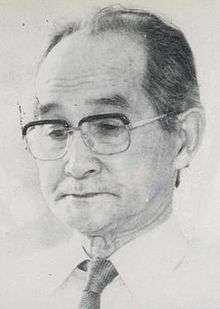Tomio Hora
Tomio Hora (洞 富雄, Hora Tomio, (born 14 November 1906 in Higashichikuma District, Nagano Prefecture, modern-day Chikuhoku; died 15 March 2000) was a Japanese historian and Waseda University professor, well known for his pioneering work on the Nanjing Massacre.

Education
Hora attended middle school at Matsumoto Kukashi High School (長野県松本深志高等学校) and high school at Waseda University High School (早稲田大学高等学院).
He was a graduate of Waseda University's literature department. He received his Doctor of Letters from Waseda.
Nanjing Massacre
In 1972, Hora published his seminal Nankin Jiken, in which he refuted revisionist denial of the Nanking Massacre.[1] The work updated his 1967 Kindai senshi no nazo ("Riddles of Modern War History").[1] This detailed treatment of the incident was a meaningful, in-depth response to revisionist accounts of Imperial Japanese action in China.
Hora's Nankin Jiken appeared amidst controversy in regards to the Nanjing Massacre scholarship of Honda Katsuichi, whose Chugoku no tabi ("Travels in China") recorded Chinese eyewitness accounts of Japanese wartime atrocities.[2] Honda's account garnered much support and stimulated debate in Japan, while at the same time attracting fearsome nationalistic defenses of Japanese military activity in the period, which materialized as historical debates, rhetorical attacks, and personal threats.[2] Hora's Nankin Jiken then appeared, which bolstered Honda's interview-based research with a documentary record, answering various attempts to undercut the Nanjing Massacre in Japanese historiography.[2]
Throughout the 1970s, Hora continued his struggle against revisionist works, publishing a number of scholarly monographs and documents on the events of the war. In 1984, he became a founding member of the Study Group on the Nanking Incident, a diverse group of scholars, lawyers, and teachers, who held a variety of views but agreed that "they had to face the past wrongs committed by Japan".[3] The organization's stated goal was the advancement of historical consciousness in Japan, in order to construct a "fortress for peace".[3]
References
- Takashi Yoshida. The making of the "Rape of Nanking". 2006, page 87
- Fogel, Joshua A. The Nanjing Massacre in History and Historiography. 2000, page 80-84
- Fogel, Joshua A. The Nanjing Massacre in History and Historiography. 2000, page 89